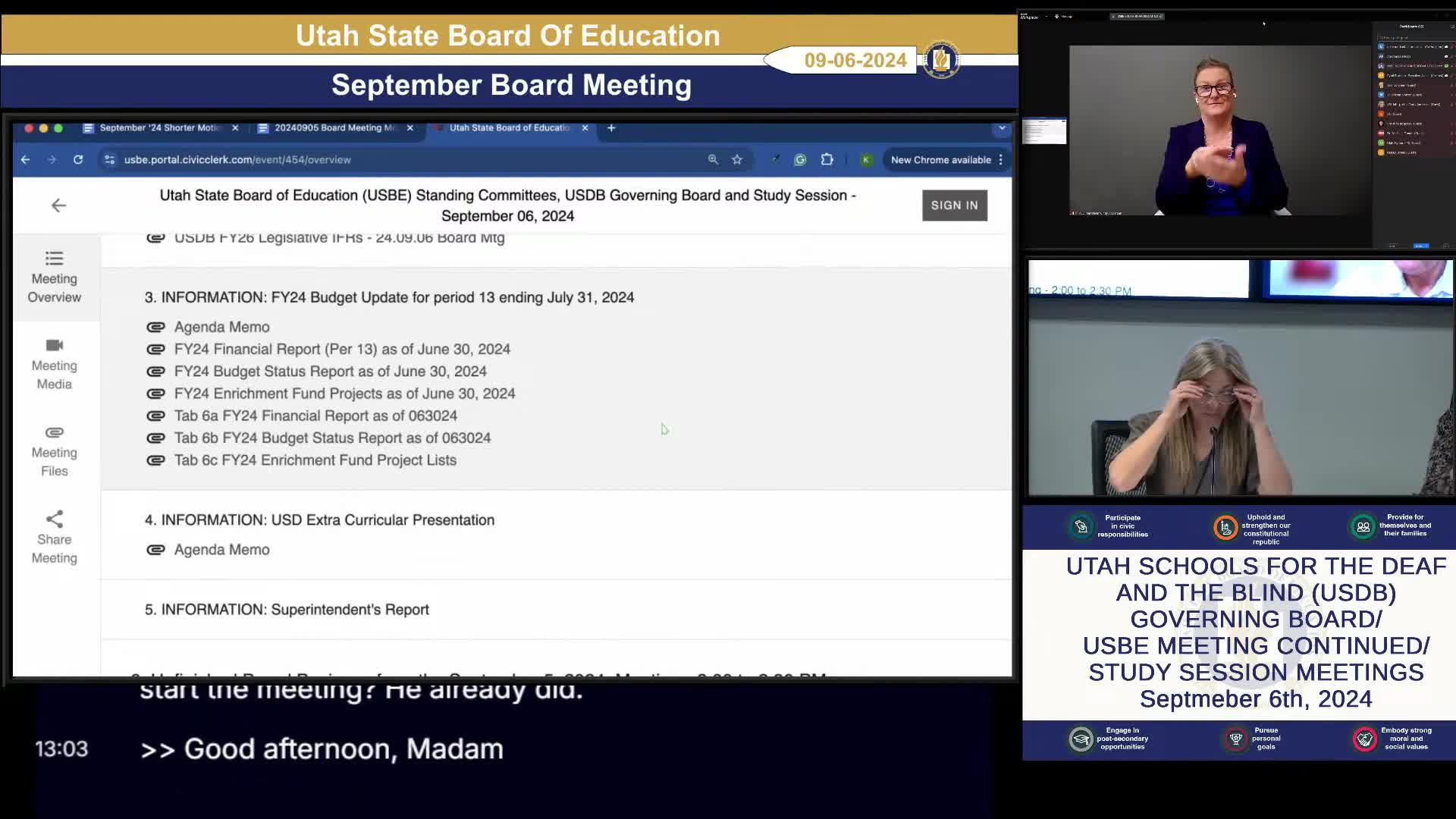USBE finance report: USDB ends fiscal year with deficit, enrichment fund drawn down after summer programs
Get AI-powered insights, summaries, and transcripts
Subscribe
Summary
Officials reported the Utah Schools for the Deaf and Blind ran a roughly $3.3 million deficit for the year that ended June 30 and drew enrichment reserves down while summer camps and expanded extracurriculars pushed some project budgets over plan.
The Utah State Board of Education heard July fiscal-year results and a report on extracurricular programming for the Utah Schools for the Deaf at its meeting, where staff said the school system ended FY2024 with a deficit and a drawdown of one-time reserves.
Superintendent Coleman reported that revenues for the year ending June 30 totaled just over $54 million while expenses totaled about $57 million, leaving a deficit in the neighborhood of $3.3 million. Staff said the agency started the year with roughly $7 million in cash and ended with about $1.8 million on hand. That balance is expected to increase slightly when roughly $900,000 in accounts receivable are collected, officials said.
Board members were told the land-grant enrichment fund — the internal fund that pays for student activities and summer programs — ended the fiscal year at about $1,051,000. Project spending through June 30 totaled $718,002.91 against board authorizations of about $631,600, producing an overspend of roughly $87,000. Officials described the overspending as the result of higher-than-expected participation on some camps and the timing of multi-year activities that overlapped fiscal years.
The superintendent’s office emphasized the difference between recurring operational expenses and one-time enrichment dollars, saying board leadership asked staff to spend down carry-forward balances during the year. “We were successful in getting a lot of contracts finally bid out and completed,” a finance presenter told the board, noting that payroll and transportation remain the largest recurring cost categories.
Administrators walked the board through funding sources: the agency receives federal and state money, dedicated credits and transfers from other state agencies. The largest single source identified was transportation funding — roughly $5 million in the last fiscal year, with staff projecting it could grow to about $6.9 million in FY2025.
Board discussion focused on how one-time funds have been used to subsidize growing program needs and whether items funded from the enrichment account should be moved into ongoing operational budgets. Dr. Tanner, an associate superintendent, explained that some extracurricular spending appeared to exceed budget because personnel and program operations had been recorded in different places; the accounting has been corrected to place those recurring personnel costs into the 400,000-series operating category.
The board also viewed a short video and heard from Jonathan Helgason, extracurricular director for the Utah Schools for the Deaf, who described the summer camps and year-round activities paid from enrichment and partnership grants. “We offer many sports and activities to any student with hearing loss throughout the state of Utah,” Helgason said. He listed partnerships with RIT, UVU, Gallaudet and community organizations and said many camps supply equipment (drones, ROVs, robotics gear) that the program keeps for classroom use after the camps end.
Officials said they expect to be more judicious with remaining reserves and to press for legislative support where recurring program costs have outgrown one-time funds. The superintendent’s office asked the board to consider a longer-term sustainability planning exercise once building studies and enrollment trends are finalized.
Board members asked staff to provide more detail on the composition of the reported revenues and on how the enrichment fund is authorized and governed. Staff said the foundation and donated funds are legally separate and do not lapse, while trust-land enrichment dollars likewise roll forward from year to year.
Board members did not take any fiscal votes in this segment of the meeting; the finance presentation closed with an invitation to board members to contact staff for line-item walkthroughs.
Ending: The board was told students are in school and that growth in program participation and transportation needs will be a focus of upcoming budget and facilities planning. Staff said they will return with more detail during the board’s budgeting cycle and when external facility study reports are available.
